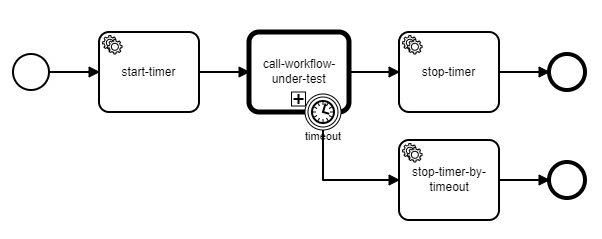This project provides a tool to automatically generate processes for Zeebe.
These processes can be used in automated tests and performance benchmarks.
The prcoess generators can either be used as a Java dependency, or they can be invoked from the command line.
Usage: [-hV] [-i=<processId>] [-o=<outputFile>] COMMAND
Creates processes
-h, --help Show this help message and exit.
-i, --processID=<processId>
ID for the process to be generated, defaults to "process"
-o, --output=<outputFile>
File to write the process to, defaults to "process.bpmn"
-V, --version Print version information and exit.
Commands:
sequence Generates a sequential process with a given number of steps.
This will produce a sequential process with a given number of steps and a given jobtype.
-j, --jobType=<jobType> Job type for steps in process, defaults to "job"
-s, --steps=<steps> Number of steps in process, defaults to "5"
This will produce a process like this:
The created process starts a timer, then calls the process that should be timed, and stops the timer at the end.
Optionally, you can also define a timeout. When the timeout is reached the process that should be timed will be aborted.
-t, --timeout=<timeout> Timeout after which process execution should be
aborted
-wut, --process-under-test-id=<processUnderTestId>
(Mandatory) ID of the workfow that should be
measured
- Generate process that calls another process n times
- Generate process that calls another process again and again until a certain time has passed
- Generate a number of processes: a sequence process, called by a timing process, called by a * repeat n times* process, called by another timing process. The net result would be a bunch of process descriptions with one big start event. Once started, the innermost process will be executed n times. Each execution is timed, and the aggregate of all executions is timed. This is - in essence - a very simple benchmark setup




